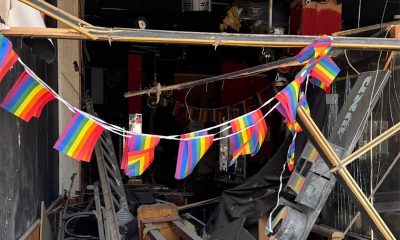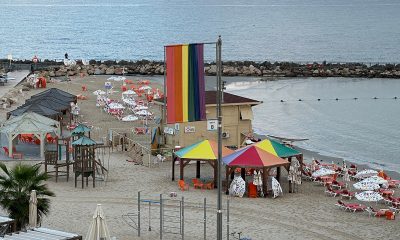Middle East
Jerusalem Pride organizers receive death threats
Israeli police on Wednesday arrested 21-year-old man
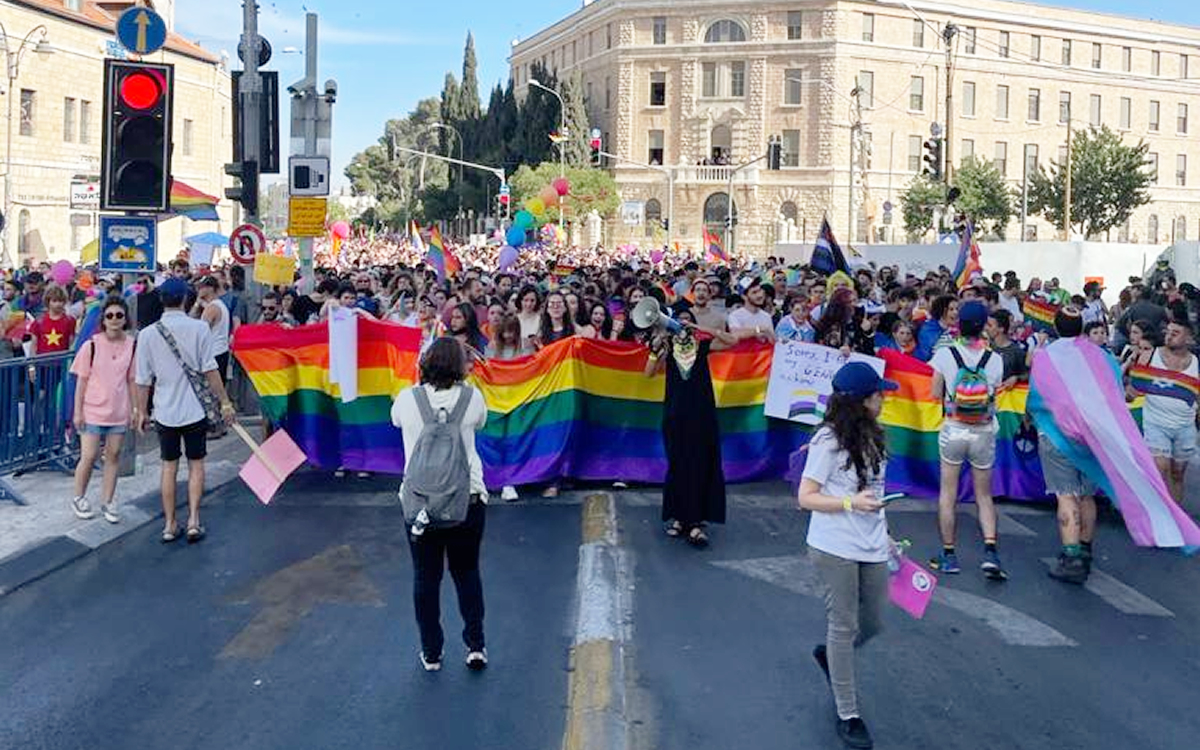
Israeli police on Wednesday arrested a man in connection with death threats made against organizers of Jerusalem’s Pride parade.
The Times of Israel reported the 21-year-old man allegedly sent a message to Jerusalem Open House for Pride and Tolerance Community Director Emuna Klein Barnoy and two Israeli lawmakers in which he described Jerusalem as “the Holy City” and said “we will not allow the Pride parade to take place in Jerusalem.”
The threat also referenced Shira Banki, the 16-year-old teenager who was stabbed to death during a Jerusalem Pride march in 2015.
An ultra-Orthodox man who stabbed Banki and five others during the march had just been released from prison after serving a 10-year sentence in connection with the stabbing of three people during a Jerusalem Pride march in 2005. The man is currently serving a life sentence in an Israeli prison.
Israeli media reports note the threat that Barnoy and the two lawmakers received on Wednesday came from an Instagram account that included the name of the man who killed Banki.
The Jerusalem Pride parade will take place on Thursday with more than 2,400 police officers deployed along the route. The Times of Israel reported the man who allegedly threatened organizers was expected to have appeared in a Jerusalem court on the same day.

Israel
Iranian missile destroys Tel Aviv’s last gay bar
Mash Central is a few blocks from US Embassy
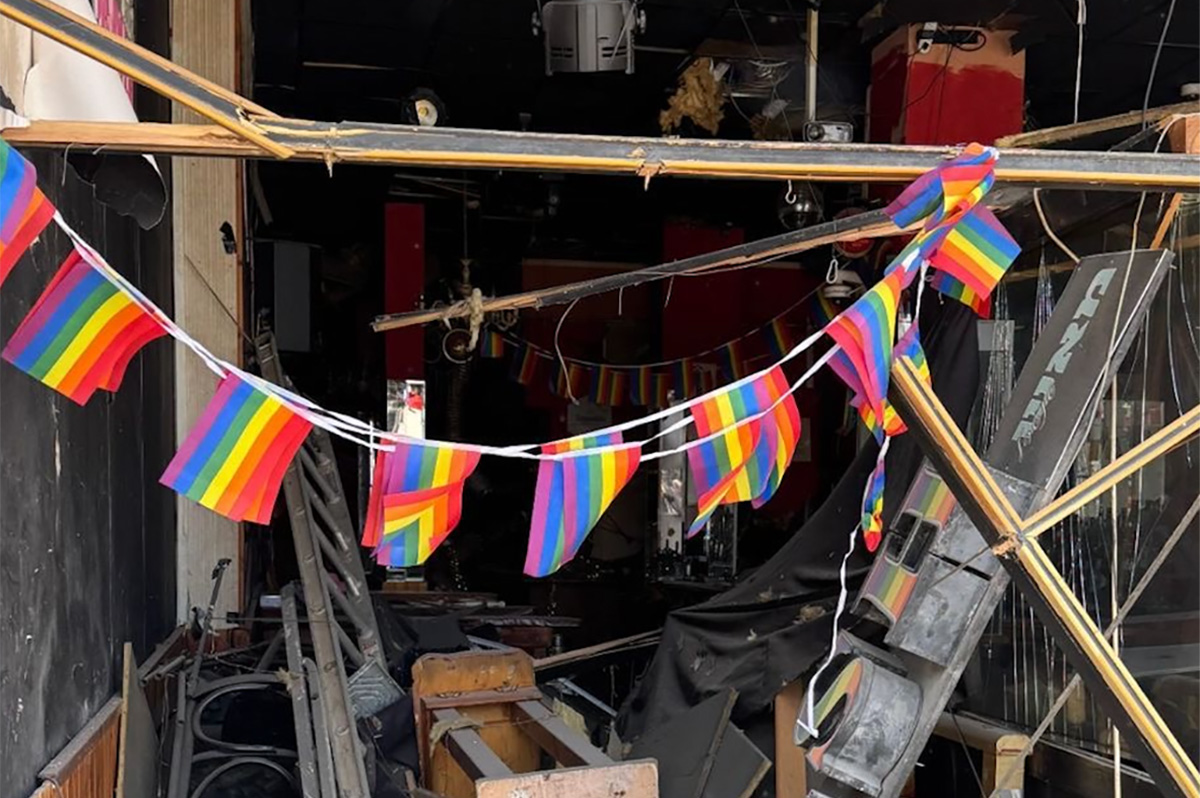
An Iranian missile on June 16 destroyed a gay bar in Tel Aviv, Israel.
The missile struck Mash Central, which is a few blocks from the U.S. Embassy on Allenby Street, and surrounding buildings. Israeli sources confirmed to the Washington Blade that Mash Central was the only gay-specific bar in Tel Aviv.
“Iran’s missile strike yesterday destroyed Tel Aviv’s only dedicated gay bar,” reads one Instagram post with pictures from inside the bar. “This place provided a safe space for minorities to express themselves — now it’s trashed.”
Mash Central describes itself as Tel Aviv’s “last gay bar standing,” even though the city promotes itself as one of the world’s most LGBTQ-friendly cities.
Israel on June 13 launched airstrikes against Iran that targeted the country’s nuclear and military facilities. Iran since the war began has launched hundreds of missiles towards Israel.
Tel Aviv’s Pride parade was scheduled to take place on June 13, but authorities cancelled it. Caitlyn Jenner, who was to have been the event’s guest of honor, is among those who were stranded in Israel after the war began.
Israel
Tel Aviv Pride parade cancelled after Israel attacks Iran
Caitlyn Jenner was to have been guest of honor
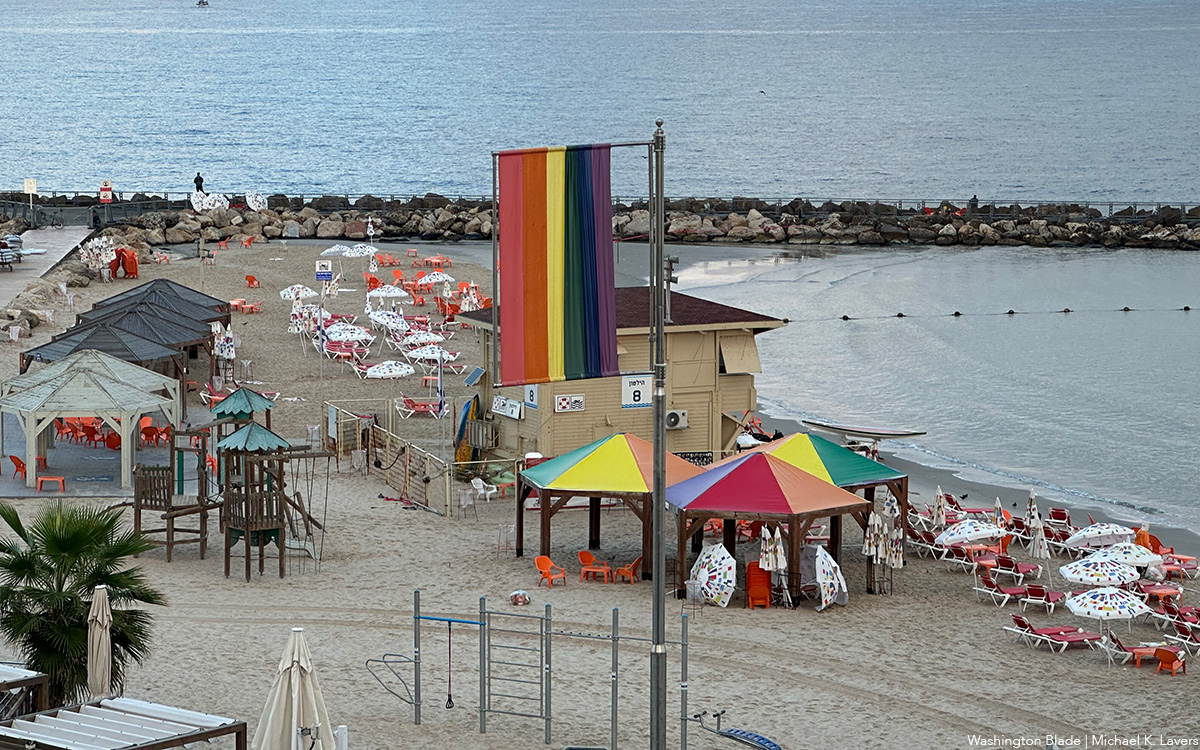
Tel Aviv authorities on Friday cancelled the city’s Pride parade after Israel launched airstrikes against Iran.
The Associated Press notes the Israeli airstrikes targeted nuclear and military facilities in Iran. Reports indicate the airstrikes killed two top nuclear scientists and the leader of Iran’s Revolutionary Guard.
Iran in response to the airstrikes launched more than 100 drones towards Israel. The Israel Defense Forces said it intercepted them.
The Tel Aviv Pride parade had been scheduled to take place on Friday. Caitlyn Jenner was to have been the event’s guest of honor.
Authorities, in consultation with local LGBTQ activists, last year cancelled the Tel Aviv Pride parade out of respect for the hostages who remained in the Gaza Strip after Oct. 7. Jerusalem’s annual Pride parade took place on June 5.
Iran
Underground queer network challenges Iranian regime
Homosexuality remains punishable by death in country

While global powers negotiate with Iran’s regime under Ayatollah Ali Khamenei to curb its advancing nuclear program, the oppressed LGBTQ community is building and operating a secret underground network to resist state-coerced sex reassignment surgeries.
These surgeries, mandated for gay and lesbian people as a state-sanctioned alternative to execution for homosexuality, are part of Iran’s penal code that criminalizes consensual same-sex sexual relations. The network provides safe houses, forged identification documents, and covert communication channels to protect members from government raids and imprisonment.
Precise data on LGBTQ people prosecuted in Iran for resisting state-coerced sex reassignment surgeries over the past decade remains elusive, as the regime’s opaque judicial system obscures such cases under vague charges like “corruption on earth” or “sodomy.” NGOs, including 6Rang, report that thousands of gay and lesbian Iranians face pressure to undergo surgeries to avoid execution for same-sex conduct, with resistance often leading to arrests or harassment for violating gender norms.
Zahra Seddiqi Hamedani and Elham Choubdar, two prominent activists, in 2022 were sentenced to death for their social media advocacy, charged with “corruption” and “human trafficking,” though their convictions were overturned in 2023. Similarly, Rezvaneh Mohammadi in 2019 received a five-year sentence for promoting “homosexual relations,” a charge hinting at resistance to the regime’s heteronormative mandates.
Arsham Parsi in 2003 escalated his clandestine fight for Iran’s LGBTQ community by launching Voice Celebration, a secret Yahoo chat group where 50 queer Iranians, using aliases, exchanged coded messages to evade the regime’s surveillance. Operating like operatives in a shadow network, participants shared text messages about human rights and survival tactics, knowing a single breach could lead to torture or execution. Parsi, then 23, orchestrated the group’s encrypted communications, building a virtual lifeline that connected isolated individuals across the country until his cover was nearly blown, forcing a desperate escape in early 2005.
Parsi in an exchange with the Washington Blade revealed a defiant undercurrent in Iran, a movement too elusive to be called traditional resistance yet pulsing with covert rebellion against the regime.
The state’s relentless push to force gay men into coerced surgeries — marketed as a “solution” to their sexuality — seeks to erase their identities through enforced conformity. Parsi, steering the International Railroad for Queer Refugees, disclosed how queer Iranians fight back with clandestine measures: Underground education to counter state propaganda, discreet psychological support to fortify resilience, and encrypted networks to forge secret alliances. These efforts, veiled to evade regime detection, dismantle the state’s narrative with every hidden signal and guarded connection.
“We are working to create a true grassroots resistance by empowering people to understand their identity, seek safe alternatives, and reclaim their agency despite the oppressive context,” said Parsi. “The Iranian regime’s policies are built on denial of sexual orientation and a forced alignment with a binary gender model.”
“Rather than recognizing gay, lesbian, or bisexual individuals, the system pressures them — particularly gay men — to undergo irreversible surgeries in order to be legally tolerated,” he added. “This systemic violence creates deep psychological harm and compels many to resist, even quietly, to protect their truth. The lack of legal recognition and the threat of arrest, harassment, or blackmail fuels the underground defiance we see today. It’s not only resistance for survival — it’s a rejection of state-imposed identity suppression.”
IRQR, guided by Parsi, for nearly two decades has operated as a lifeline, orchestrating daring escapes and running a covert network for Iran’s hunted queer community.
Parsi said his work relies on secret, encrypted channels — meticulously managed to avoid detection — to funnel at-risk individuals to safety, smuggle life-saving information, secure hidden safe houses, and deliver emotional support. Every operation faces threats not only from the regime’s security forces but also from Basij militia operatives who masquerade as queer individuals to infiltrate networks, heightening the peril for those marked by their identities.
Black-clad Basij militia members respond at the first signs of defiance; tearing through crowds on motorcycles with batons and guns at the ready, poised to crush any challenge to Iran’s regime. These paramilitary volunteers, bound by fierce loyalty to the Islamic Republic, serve as the state’s enforcers, their plainclothes operatives slipping into dissident networks to root out the defiant.
The Basij fill queer Iranians with dread; their so-called morality patrols and digital traps stalking those who dare to exist outside the regime’s rigid norms.
“Their goal is not only to gather intelligence but to undermine, divide, and cancel the work of activists and organizations like ours,” said Parsi. “This divide-and-conquer strategy is designed to break solidarity and generate mistrust.”
“We have seen numerous cases where trusted circles were compromised by these informants, and it has made our work — and survival — even more complex,” he further noted. “Despite this, we persist. Through our underground connections, we have helped thousands of queer Iranians seek safety, community, and ultimately, freedom.”
Parsi told the Blade that international support — through funding, advocacy, policy pressure, or amplifying his stories — can significantly strengthen his work to protect Iran’s persecuted queer community. He emphasized IRQR operates with limited resources, making global solidarity essential to improve outreach, enhance safety measures, and respond swiftly to those in need. Parsi underscored such support brings visibility to the crisis in Iran, reminding those at risk they are not forgotten while exerting pressure on a regime that thrives on silence and fear.
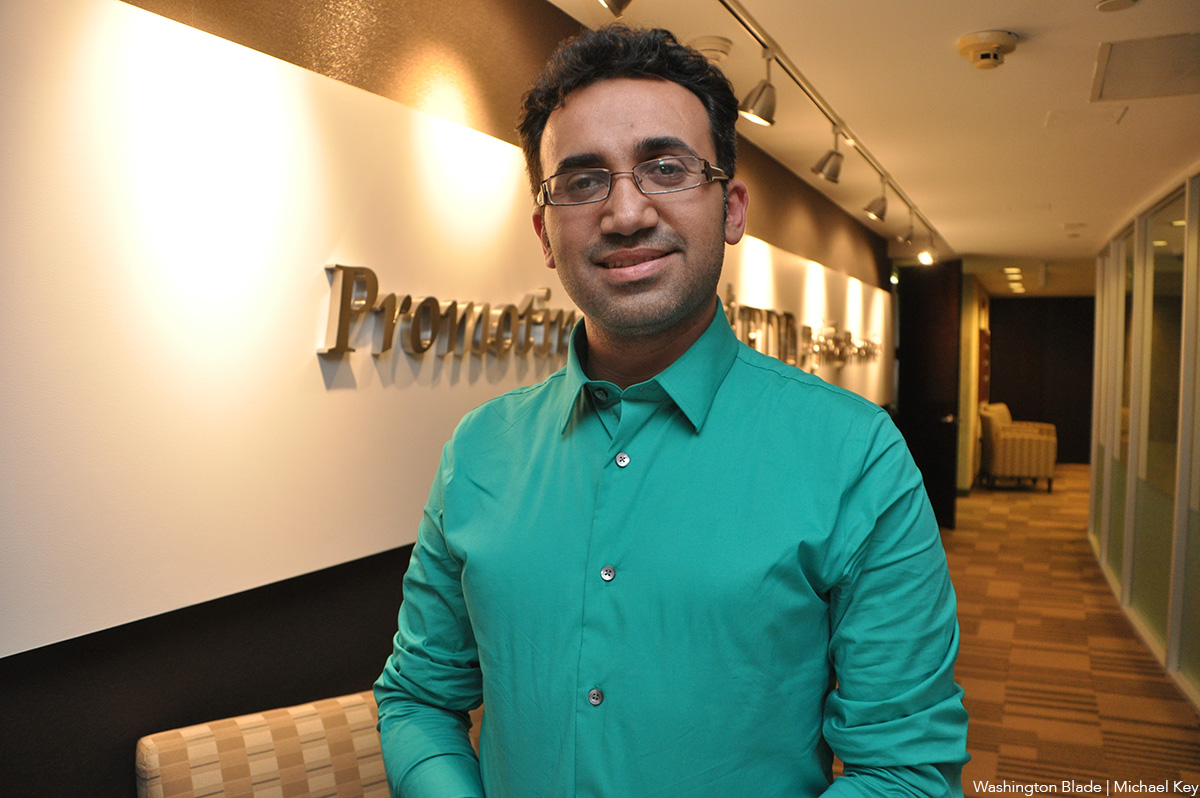
One of the things that Parsi’s underground network offers is online workshops that educate queer Iranians about how they can remain beyond the regime’s reach.
He said these sessions, designed for safety and accessibility, encompass peer support, mental health education, digital security training, and guidance on refugee pathways. Parsi explained the workshops give vulnerable Iranians the tools to navigate persecution, defy state surveillance, and pursue escape, exposing the resilience of a community under relentless scrutiny.
“Due to the high risk of persecution in Iran, traditional protests are not feasible,” said Parsi. “Instead, acts of resistance take quieter forms — like anonymous storytelling which are just as powerful in building awareness and connection within the community. While discreet, these activities help create a sense of solidarity and empowerment among queer Iranians.”
Parsi, undeterred by Iran’s unyielding regime, asserted with measured confidence that while underground acts of defiance — living authentically, supporting one another, resisting forced medicalisation — may not shift policy overnight, they are already improving lives. He stressed these quiet rebellions that queer Iranians stage challenge the regime’s narrative of shame and invisibility, forging a resilient foundation for future change. Each act, Parsi emphasized, dismantles the regime’s grip, offering hope to those navigating a landscape of relentless oppression.
“At IRQR, we view each life saved, each network built, and each truth spoken as a small but powerful act of resistance,” said Parsi. “These are the seeds of future liberation. Over time, as they multiply and gain visibility — locally and internationally — they will help reshape the landscape for queer Iranians.”
ILGA Asia Executive Director Henry Koh said queer Iranians’ underground resistance is a powerful assertion of bodily autonomy and self-determination. He described it as a deeply courageous act in a regime where visibility invites immense personal risk, from arrest to execution.
When asked by the Blade if the Iranian regime’s punitive measures against openly queer people fuel underground resistance, Koh responded unequivocally.
“Absolutely,” he said. “The climate of criminalization and repression leaves little safe space for queer people to live openly. This forces many into secrecy or underground networks as a means of survival, resistance, and mutual support. Such conditions are not only unjust but also profoundly harmful to the well-being of LGBTIQ+ individuals.”
“It is important to distinguish between affirming gender-affirming care and any form of coercive medical intervention,” he added. “When states or authorities mandate medical procedures as a condition for recognition or safety, it constitutes a grave violation of human rights. Gender identity is deeply personal, and no institution should override an individual’s self-defined identity.”
-

 U.S. Supreme Court4 days ago
U.S. Supreme Court4 days agoSupreme Court upholds ACA rule that makes PrEP, other preventative care free
-

 U.S. Supreme Court4 days ago
U.S. Supreme Court4 days agoSupreme Court rules parents must have option to opt children out of LGBTQ-specific lessons
-

 District of Columbia5 days ago
District of Columbia5 days agoMan sentenced to 15 years in prison for drug deal that killed two DC gay men
-

 Federal Government5 days ago
Federal Government5 days agoWhite House finds Calif. violated Title IX by allowing trans athletes in school sports
